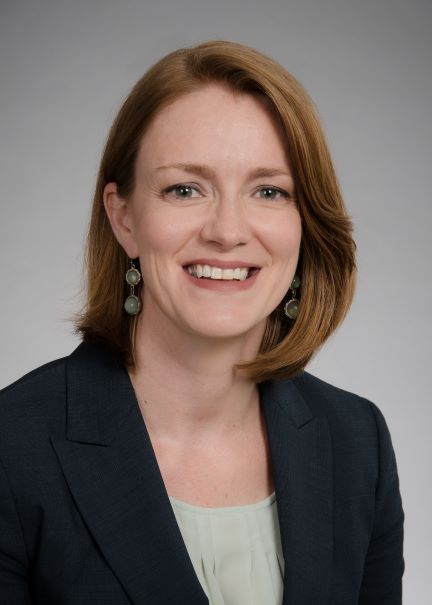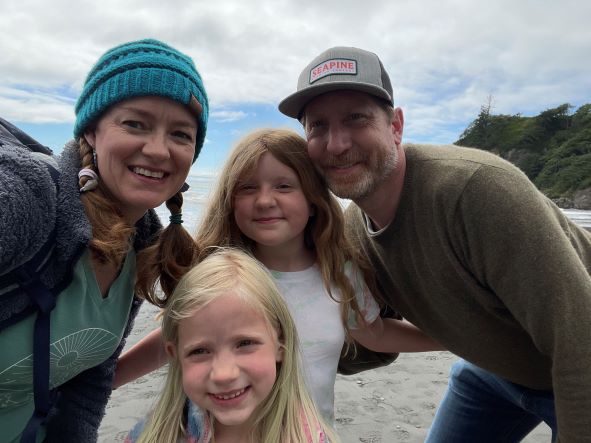

Faculty Spotlight: Melissa Robinson
In honor of National Heart Month, our February Faculty Spotlight is Dr. Melissa R. Robinson, clinical associate professor (Cardiology) and Director of the Complex Ablation Program and Electrophysiology (EP) Service.  Robinson is an expert in complex arrhythmia management, including ablation, device and medical therapy.
Robinson is an expert in complex arrhythmia management, including ablation, device and medical therapy.
Robinson and the UW Medicine EP Service evaluate and treat heart rhythm conditions, particularly ventricular tachycardia and arrhythmias associated with congenital heart disease, through a combination of medical- and procedural- based therapies. Collaborating with electrophysiologists throughout the WWAMI region to treat complex arrhythmias is one Robinson’s favorite aspects of her work.
“The fantastic electrophysiology labs at Montlake and UW Northwest bring such expertise and experience to remarkably complex cases,” she said, “and in combination with our highly skilled CRNAs and Cardiac Anesthesia team, we are able to take even the sickest patients through challenging procedures safely and effectively.”
Early Career
Robinson is an alumna of the University of California, Berkeley and received her Medical Degree from the University of California, San Francisco. She completed Internal Medicine Residency and Cardiovascular Medicine Fellowship at the University of California, Davis Medical Center and then a Clinical Cardiac Electrophysiology Fellowship at the Hospital of the University of Pennsylvania in Philadelphia, PA.
She then served as the Director of Electrophysiology Services and Electrocardiography at the University of Illinois Medical Center in Chicago before coming to UW Medicine in 2013 to lead the Complex Ablation Program.
Like many physicians, Robinson has had several mentors throughout her career, among whom she names Frank Marchlinski, MD, Marc Diamond, MD and Ezra Amsterdam, MD as individuals who each gave of their time and expertise in critical moments of her career.
Additionally, she shared that she is “very thankful for the more-rare sponsors that I have had over the years. Kris Patton, MD, professor (Cardiology, Electrophysiology), has been that sponsor for me, having an outside impact on me personally and professionally over my years here at UW.”
Robinson continues, “[Dr. Patton] has generously referred many patients to my care, critically put my name forward in professional society activities and is always helping me see an ECG, device tracing or electrogram in a new way. It is easy for me to see the impact she has in many of my current professional activities and I am very grateful for her support.”
Current Work
Along with colleagues in the UW Heart Institute, Robinson is currently working with the Adult Congenital Heart Disease (ACHD) team to expand arrhythmia prevention in patients with repaired tetralogy of Fallot (TOF).
Tetralogy of Fallot
A congenital heart condition characterized by four related heart defects changing the way blood flows to the lungs and through the heart.
This condition represents a relatively large portion of the Heart Institute’s ACHD population. Over time, these patients are particularly at risk of ventricular tachycardia (VT), an irregular heart rhythm that can lead to a reduction in oxygenated blood supply.
Robinson and her team have been able to use new electrophysiology mapping techniques to help better understand and reduce this risk.
“[Electrophysiology mapping techniques] allow us to predict future VT and perform preventive ablations that we hope will decrease both sudden death risk and the need for defibrillators in the future,” she said.
The UW’s depth in this somewhat niche area of electrophysiology has allowed Robinson the opportunity to collaborate with other ACHD EP colleagues around the world on shared investigations, protocols and guidance documents. “It is a very exciting moment in this field.”
Robinson is also excited about the publication of the first document addressing Arrhythmia Management in Pregnant Patients from the Heart Rhythm Society, for which she served on the writing committee at the suggestion of Dr. Patton (in her role as Chair of the Scientific and Clinical Documents Committee.)
“I shared much of our recommendations in a Cardiology Grand Rounds lecture last March, so the publication has been a long time coming,” she said. After some delay during the pandemic, the paper will be published later this year.
She also enjoys engaging with the active conference and symposia community around electrophysiology, participating in education events for attendings, fellows and allied health professionals across the country.
“The pandemic has shifted many of these to virtual meetings, of course, but this has opened up more opportunities for international attendees and more specific topics,” she said. “I have actually ended up participating in more events over the last year than I would have previously and the educational offerings are more accessible than ever.”
Did you know…
 Outside of her clinical passions, Robinson’s personal interests include paddle boarding, cooking, and spending time with her children. She is also enthusiastic about her “COVID hobby of beachcombing on the accessible shores of the Salish Sea and the Pacific Ocean in our unique corner of the world, the Pacific Northwest.”
Outside of her clinical passions, Robinson’s personal interests include paddle boarding, cooking, and spending time with her children. She is also enthusiastic about her “COVID hobby of beachcombing on the accessible shores of the Salish Sea and the Pacific Ocean in our unique corner of the world, the Pacific Northwest.”
“Stop me in the hallway sometime and I can talk your ear off about the carnivorous Lewis’ moon snail, the gumshoe chiton (the world’s largest chiton species) or even the acrobatic Nuttall’s cockle,” she said.
“My husband and children are just glad that my growing collection of shells and tumbled rocks are mostly contained in my basement office!”